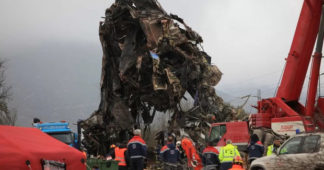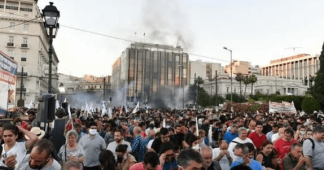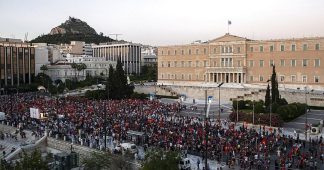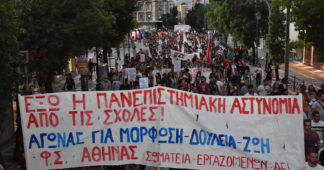Protesters clashed with police in front of the Greek parliament in Athens amid continuing demonstrations against the government.
Clashes have erupted between police and a group of demonstrators outside the Greek parliament in Athens on the fringes of a protest by thousands of students and railway workers over Greece’s deadliest train crash in living memory.
A small group of protesters hurled petrol bombs at police and set fire to rubbish bins on Sunday.
Police responded by firing tear gas and stun grenades, clearing Syntagma Square of the protesters within a few minutes. The protesters then dispersed to nearby streets.
Police said 12,000 people had gathered by the large esplanade in front of the parliament to demand accountability for Tuesday’s head-on collision near the central city of Larissa that has sparked widespread outrage.
At least 57 people were killed and dozens were injured when a passenger train with more than 350 people on board collided with a freight train on the same track in central Greece.
After protests over the past three days across the country, some 10,000 students, railway workers and groups affiliated with left-wing parties gathered in Athens’s Syntagma Square to express sympathy for the lives lost and to demand better safety standards on the rail network.
“That crime won’t be forgotten,” protesters shouted as they released black balloons into the sky. A placard read: “Their policies cost human lives.”
The train, travelling from Athens to the northern city of Thessaloniki, was packed with university students returning after a long holiday weekend. The disaster has triggered an outpouring of anger, as well as a sharp focus on safety standards.
Railway workers, who also lost colleagues in the accident, have staged rotating walkouts since Wednesday to denounce cost-cutting and underinvestment in the rail infrastructure, a legacy of Greece’s debilitating debt crisis from 2010 to 2018.
PM promises justice
Prime Minister Kyriakos Mitsotakis’s government has blamed human error for the crash. However, Mitsotakis said on Sunday that human error should not deflect from responsibilities for a long-suffering railway network.
“As prime minister, I owe everyone, but most of all the relatives of the victims, an apology,” he wrote on Facebook. “Justice will very fast investigate the tragedy and determine liabilities.”
A station master in the nearby city of Larissa who was on duty at the time of the crash was charged this week with endangering lives and disrupting public transport.
The station master, who cannot be named under Greek law, appeared before a magistrate on Sunday after his lawyer requested extra time on Saturday to respond to the charges following new information concerning the case. Those proceedings were ongoing.
Railway workers’ unions say safety systems throughout the rail network have been deficient for years as a remote surveillance and signalling system has not been delivered on time. They have called on the government to provide a timetable for the implementation of safety protocols.
Mitsotakis said on Sunday that if there had been a remote system in place throughout the rail network “it would have been, in practice, impossible for the accident to happen”.
Greece would soon announce action, he said, adding that Athens would seek expertise from the European Commission and other countries on improving rail safety.
Pope Francis said on Sunday his thoughts were with the crash victims. “I pray for the dead, I am close to the injured and their relatives, and may Our Lady comfort them,” he said in his weekly address to crowds in St Peter’s Square, Rome.
Train and metro services have been paralysed by strike action.
We remind our readers that publication of articles on our site does not mean that we agree with what is written. Our policy is to publish anything which we consider of interest, so as to assist our readers in forming their opinions. Sometimes we even publish articles with which we totally disagree, since we believe it is important for our readers to be informed on as wide a spectrum of views as possible.











